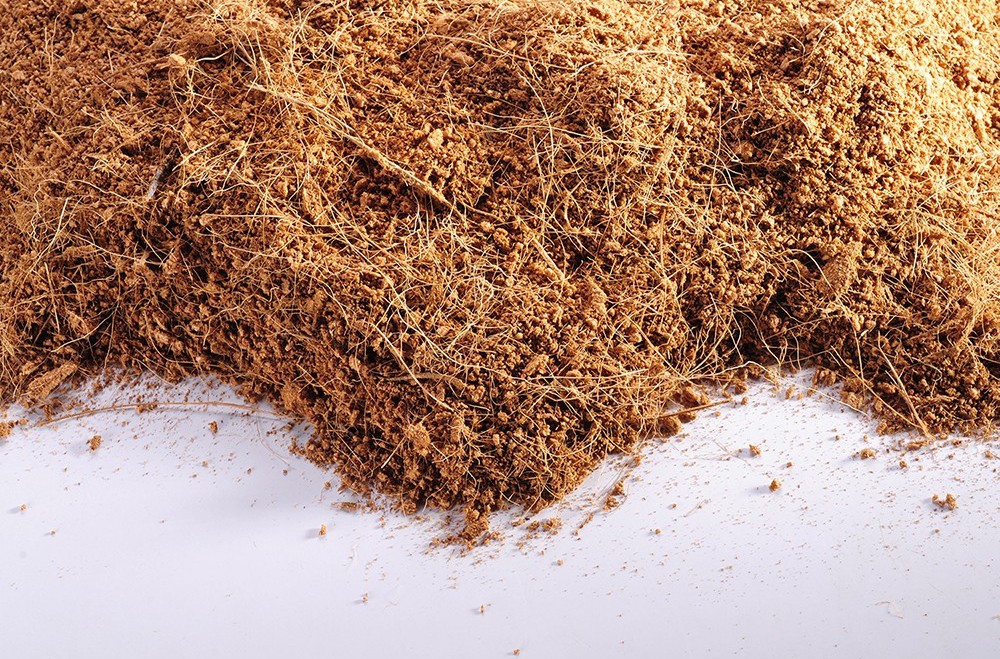Coconut peat is a multifunctional based nutrient for the plants. Coconut fiber is pre-washed, dried, sieved, and cleaned of sand and other impurities such as animal and vegetable waste. Coconut peat is an excellent alternative to traditional stone wool and peat moss. Its air-filled porosity and high water retention capacity make it an ideal environment for growing vegetables. It is 100% organic and ecological, free from soil pathogens and weeds.
Advantages of Coco Peat
Peat moss is not a permanent source for horticulture. It is a dangerous and environmentally sensitive peat extraction product. Here is an educational article on this subject. Coconut peat is an alternative to peat moss. It is even better than peat moss because it protects water, retains moisture, keeps sewage, vents, and is more resistant to diseases, pests, and weeds. Coconut moss can be used in many industries such as seedlings, greenhouses, worm beds, hydroponics, garden and flower nurseries, container gardens, etc.
Coco Peat Bricks
Coco fibers are crushed and pressed into bricks. The bricks can be easily packed, store, sold, and moved. The coir must be recovered before use.
Ways to use Coco Peat
Pre-mixing for Seeds
Coco peat is most often used for seed incarnation. It is an excellent addition to the original seed mixture as it helps to keep the seeds moist, especially in summer. It also helps to inflate the soil, allowing the seedlings to take root easily.
Keeps the Soil Moist
Using coir to produce seeds also helps keep seedlings moist, as too high a temperature can dry out seeds and seedlings during germination.
Please note that coco peat alone is not recommended for seed growth because it does not contain the necessary nutrients and remains moist for too long. This can lead to the death of the seedlings.
Breaks Hard Soil
If you want to improve the condition of hard or clayey soils that are easy to compact or shredded, you can add about 25% coir and 25% compost to improve soil structure. This allows the roots of your plants to breathe and grow deep, making them healthy. It also ensures better water absorption.
This is a common problem in pots, if the soil is too hard, the water is not absorbed, but is removed by the sidewalls and the plant slowly dies.
Indoor plants
Coconut peat is also an excellent substrate for growing household plants, as it is less harmful and moisturizes household plants for a long time, reducing the need to water them. This way you can grow plants that do not need much care and you do not have to worry about watering them for a few days while traveling.
The indoor soil can contain 40% coco peat with little compost, black earth, and sand, depending on the needs of the plants growing at home.
Reducing the Weight of the Soil
It is a lightweight plant carrier, ideal for ships that do not carry heavy loads. The normal garden soil becomes heavier when sprayed, so some can be replaced with coco peat. It is best to use wall-mounted pots and large pots that need to be moved regularly.
Hanging Basket for Moisture Storage
It is also ideal for hanging baskets, as it helps to keep them moist for a long time and reduces the weight of the basket. It is ideal for storing baskets that hang in the summer because they dry quickly.
Mulching
You can also use a thick layer of coco peat as a mulch to clean pots, fight small weeds and keep the soil moist. It also reduces the need for irrigation and serves as an irrigation indicator. If you are not sure when to water your plants, wait until the coir looks dry and light brown. If it is dark brown, there is no need to water it.
Wrapping Up
When you buy this type of brick, put steam in a 5-gallon bucket, and add hot water. Break bricks by hand, or you can soak the coir for two hours. If you’re just planting in coir alone, you’ll probably want to add time-saving fertilizer because the coco fiber contains very few nutrients for spreading.
It contains a lot of potassium as well as iron, zinc, manganese, and copper. If you use the soil and want to add coco peat as an aerator or water fixer, it is recommended that the product contains only a 40% nutrient solution. Coco peat should always be well moistened and regularly checked for water in the plants.

